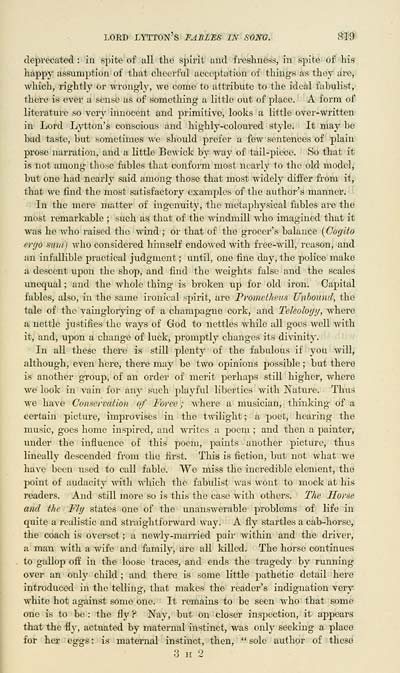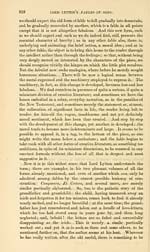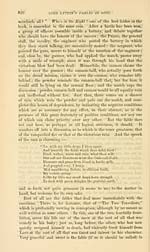Non-Fiction > Uncollected essays > Volume 15, 1874 - Fortnightly review
(15) Page 819
Download files
Complete book:
Individual page:
Thumbnail gallery: Grid view | List view

LORD LYTTON's FABLES IN SONG. 819
deprecated : in spite of all the spirit and freshness, in spite of hie
happy assumption of that cheerful acceptation of things as they are,
which, rightly or wrongly, Ave come to attribute to the ideal fabulist,
there is ever a sense as of something a little out of place. A form of
literature so very innocent and primitive, looks a little over-written
in Lord Lytton's conscious and highly-coloured style. It may be
bad taste, but sometimes we should prefer a few sentences of plain
prose narration, and a little Bewick by way of tail-piece. 80 that it
is not among those fables that conform most nearl}'" to the old model,
but one had nearly said among those that most widely differ from it,
that we find the most satisfactory examj)les of the author's manner.
In the mere matter of ingenuity, the metaphysical fables are the
most remarkable ; such as that of the windmill who imagined that it
was he who raised the wind ; or that of the grocer's balance [Cogito
ergo sum) who considered himself endowed with free-will, reason, and
an infallible practical judgment ; vmtil, one fine day, the police make
a descent upon the shop, and find the weights false and the scales
unequal ; and the whole thing is broken tip for old iron. Capital
fables, also, in the same ironical spirit, are Prometheus Unbound, the
tale of the vainglorying of a champagne cork, and Teleologij, where
a nettle justifies the ways of God to nettles while all goes well with
it, and, upon a change of luck, promptly changes its divinity.
In all these there is still plenty of the fabulous if you will,
although, even here, there may be two opinions possible ; but there
is another group, of an order of merit perhaps still higher, where
Ave look in vain for any such playful liberties with Nature. Thus
\^'e have Conservation of Force ; where a musician, thinking of a
certain picture, improvises in the twilight ; a poet, hearing the
music, goes home inspired, and writes a jjoem ; and then a painter,
under the influence of this poem, paints another picture, thus
lineally descended from the first. This is fiction, but not what we
have been used to call fable. "We miss the incredible element, the
point of audacity with which the fabulist AAas wont to mock at his
readers. And still more so is this the case with others. The Horse
and the Fli/ states one of the unansAverable problems of life in
quite a realistic and straightforAvard Avay. A fly startles a cab-horse,
the coach is overset ; a newly-married pair within and the driA'er,
a man with a wife and family, are all killed. The horse continues
to gallop off in the loose traces, and ends the tragedy by running
over an only child ; and there is some little pathetic detail here
introduced in the telling, that makes the reader's indignation very
Avhite hot against some one. It remains to be seen AA'ho that some
one is to be : the fly ? Nay, but on closer inspection, it appears
that the fly, actuated by maternal instinct, was only seeking a place
for her eggs : is maternal instinct, then, " sole author of these
3 H 2
deprecated : in spite of all the spirit and freshness, in spite of hie
happy assumption of that cheerful acceptation of things as they are,
which, rightly or wrongly, Ave come to attribute to the ideal fabulist,
there is ever a sense as of something a little out of place. A form of
literature so very innocent and primitive, looks a little over-written
in Lord Lytton's conscious and highly-coloured style. It may be
bad taste, but sometimes we should prefer a few sentences of plain
prose narration, and a little Bewick by way of tail-piece. 80 that it
is not among those fables that conform most nearl}'" to the old model,
but one had nearly said among those that most widely differ from it,
that we find the most satisfactory examj)les of the author's manner.
In the mere matter of ingenuity, the metaphysical fables are the
most remarkable ; such as that of the windmill who imagined that it
was he who raised the wind ; or that of the grocer's balance [Cogito
ergo sum) who considered himself endowed with free-will, reason, and
an infallible practical judgment ; vmtil, one fine day, the police make
a descent upon the shop, and find the weights false and the scales
unequal ; and the whole thing is broken tip for old iron. Capital
fables, also, in the same ironical spirit, are Prometheus Unbound, the
tale of the vainglorying of a champagne cork, and Teleologij, where
a nettle justifies the ways of God to nettles while all goes well with
it, and, upon a change of luck, promptly changes its divinity.
In all these there is still plenty of the fabulous if you will,
although, even here, there may be two opinions possible ; but there
is another group, of an order of merit perhaps still higher, where
Ave look in vain for any such playful liberties with Nature. Thus
\^'e have Conservation of Force ; where a musician, thinking of a
certain picture, improvises in the twilight ; a poet, hearing the
music, goes home inspired, and writes a jjoem ; and then a painter,
under the influence of this poem, paints another picture, thus
lineally descended from the first. This is fiction, but not what we
have been used to call fable. "We miss the incredible element, the
point of audacity with which the fabulist AAas wont to mock at his
readers. And still more so is this the case with others. The Horse
and the Fli/ states one of the unansAverable problems of life in
quite a realistic and straightforAvard Avay. A fly startles a cab-horse,
the coach is overset ; a newly-married pair within and the driA'er,
a man with a wife and family, are all killed. The horse continues
to gallop off in the loose traces, and ends the tragedy by running
over an only child ; and there is some little pathetic detail here
introduced in the telling, that makes the reader's indignation very
Avhite hot against some one. It remains to be seen AA'ho that some
one is to be : the fly ? Nay, but on closer inspection, it appears
that the fly, actuated by maternal instinct, was only seeking a place
for her eggs : is maternal instinct, then, " sole author of these
3 H 2
Set display mode to: Large image | Transcription
Images and transcriptions on this page, including medium image downloads, may be used under the Creative Commons Attribution 4.0 International Licence unless otherwise stated. ![]()
| Early editions of Robert Louis Stevenson > Non-Fiction > Uncollected essays > Fortnightly review > (15) Page 819 |
|---|
| Permanent URL | https://digital.nls.uk/79231521 |
|---|
| Form / genre: |
Written and printed matter > Periodicals |
|---|---|
| Dates / events: |
1874 [Date published] |
| Places: |
Europe >
United Kingdom >
England >
Greater London >
London
(inhabited place) [Place published] |
| Subject / content: |
Reviews (document genre) |
| Person / organisation: |
Stevenson, Robert Louis, 1850-1894 [Contributor] Chapman and Hall [Publisher] Morley, John, 1838-1923 [Editor] |
| Description | Essays and reviews from contemporary magazines and journals (some of which are republished in the collections). 'Will o' the Mill', from Volume 37 of the 'Cornhill Magazine', is a short story or fable. |
|---|
| Person / organisation: |
Stevenson, Robert Louis, 1850-1894 [Author] |
|---|



